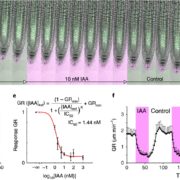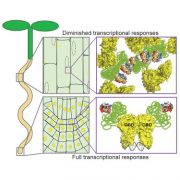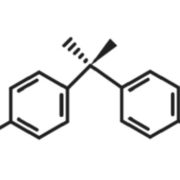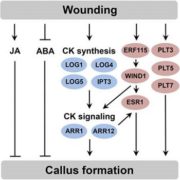Synthetic hormone-responsive transcription factors can monitor an reprogram plant development
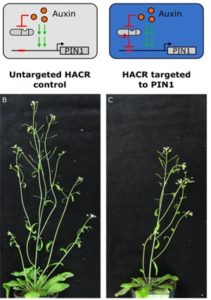 Development is driven by the activities of hormones which control expression of various traits. Modeling hormone pathways is complicated by extensive cross-talk, redundancy, and feedback loops. Khakhar et al. investigate the use of a technique known as Hormone Activated Cas9-based Repressors (HACRs) to alter specific hormone pathways in Arabidopsis. HACRs are modular in nature, allowing for insertion of a specific and inducible degradation target sequence. One such HACR tested had an auxin-inducible sequence which, in the presence of auxin, inhibits a downstream target responsible for repression of your gene of interest (GOI), allowing for activation of your GOI (i.e. fluorescent reporter). Two other variants were tested using the plant hormones jasmonate and gibberellin. All three HACRs were sensitive to their respective hormones, both endogenously and exogenously supplied, and were monitored in different tissues at varying developmental stages. Endogenous activation of HACRs resulted in predictable expression patterns. In a practical demonstration, the authors generated transgenic plants with a HACR targeting PIN1, presumably altering the threshold level of auxin required for PIN1 induction during lateral organ development. As hypothesized, these transgenic plants exhibited fewer co-initiating lateral organs. HACRs could be an efficient way to target single genes and reprogram developmental traits in many crop species. (Summary by Alecia Biel) BioRxiv 10.1101/236901
Development is driven by the activities of hormones which control expression of various traits. Modeling hormone pathways is complicated by extensive cross-talk, redundancy, and feedback loops. Khakhar et al. investigate the use of a technique known as Hormone Activated Cas9-based Repressors (HACRs) to alter specific hormone pathways in Arabidopsis. HACRs are modular in nature, allowing for insertion of a specific and inducible degradation target sequence. One such HACR tested had an auxin-inducible sequence which, in the presence of auxin, inhibits a downstream target responsible for repression of your gene of interest (GOI), allowing for activation of your GOI (i.e. fluorescent reporter). Two other variants were tested using the plant hormones jasmonate and gibberellin. All three HACRs were sensitive to their respective hormones, both endogenously and exogenously supplied, and were monitored in different tissues at varying developmental stages. Endogenous activation of HACRs resulted in predictable expression patterns. In a practical demonstration, the authors generated transgenic plants with a HACR targeting PIN1, presumably altering the threshold level of auxin required for PIN1 induction during lateral organ development. As hypothesized, these transgenic plants exhibited fewer co-initiating lateral organs. HACRs could be an efficient way to target single genes and reprogram developmental traits in many crop species. (Summary by Alecia Biel) BioRxiv 10.1101/236901


